In this post, we will discover 12 tools for studying the Bible. Each Bible study tool will help you dive into Scripture and grow closer to the Lord. So, let’s get started…
Studying the Bible can seem daunting, especially when you are first starting out. But it doesn’t have to be that way. No matter your skill level or spiritual maturity you can deepen and sharpen your bible study abilities. And one way we can do that is through good solid Bible study tools.
This isn’t my first article on the topic. I have one on Bible Study Software, and Free Online Bible Study Tools that you can check out as well. I utilize online and offline resources. It’s amazing how much information we can glean.
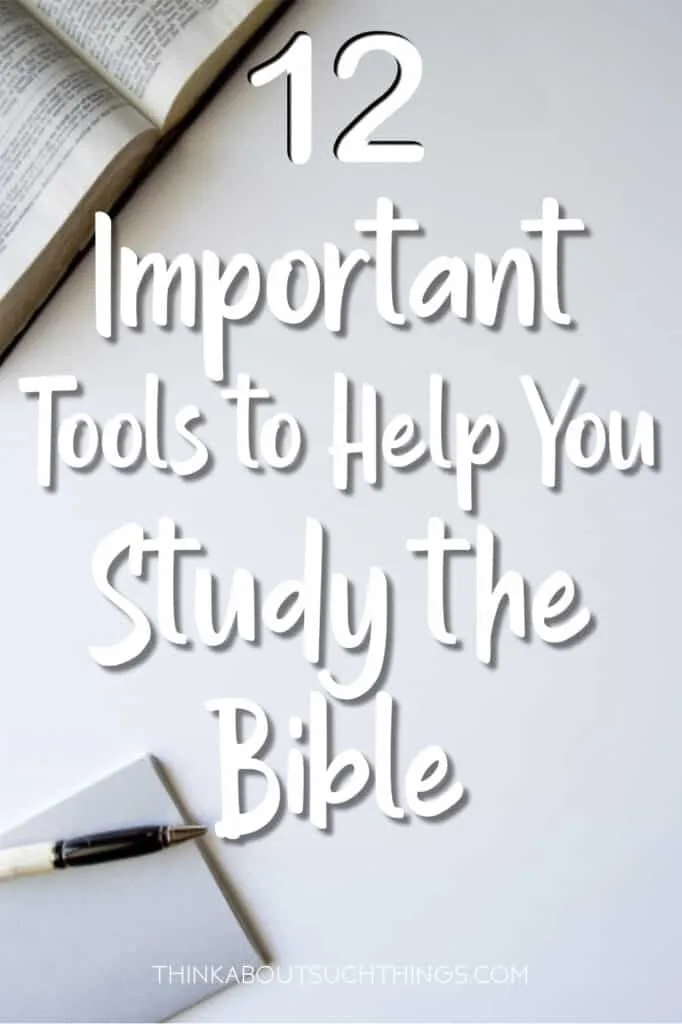
In this article, we will look at tools for studying the Bible that I believe are important for us to get a good understanding of scripture. They will help you greatly and please don’t think you need all 12 to be successful. The biggest key is a heart that is willing to learn and partner with the Holy Spirit while studying the Bible. He is our Teacher.
The Best Tools for Studying the Bible
Some tools for studying scripture can either be purchased as in books, used online (some free, some paid), or in software. This is totally up to you on how you want to pursue your study time. Like I mentioned above…I do a little of it all. I will put my recommendations in each one and you can ultimately decide what is the best for you.
Here are just a small about of Bible tools I have in my office. This isn’t even including my massive Strong Bible Concordance.
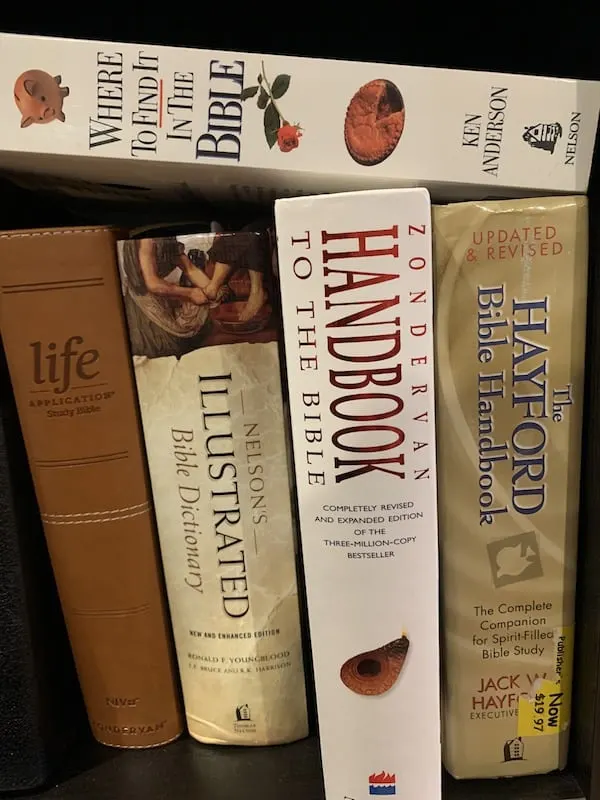
1. Various Bible Translations and Study Bibles
First and foremost I am a sucker for Study Bibles. When I got saved my first Bible was a Life Application Study Bible. It was incredibly helpful in my growth and understanding of the Word. If you don’t have a study Bible I highly recommend you get one. They truly enrich your reading time. I probably have 10 different ones. I know a lot…but I love them.
I also recommend having different Bible translations. You can either purchase these different translations or you can use online resources like BibleHub, which does an amazing job of paralleling different translations.
Looking at different translations can really be helpful to see the verse in a different light. Some of my favorite translations are:
- King James Version
- New King James Version
- Amplified
- NIV
- NASB
There are many other great translations. But I would caution using the Message or Passion translations for studying as they paraphrase scripture so that it relates more to our common modern-day language.
Study Bibles I Recommend
2. Prayer
Prayer. No joke probably the most important thing on this list. God’s Word is incredible and to fully understand it we need His help.
You should always pray before starting a Bible study. Ask the Lord to guide you, to open your eyes, and give you revelation as you read and study. You will be amazed at what the Holy Spirit will show you.
I also encourage you to pray throughout your study time. There have been moments when studying scripture that I am confused or unsure. I will stop and ask the Lord to make things clear to me. Then there have been moments when all the dots connect and spiritual truth is revealed to me.
It’s like the Holy Spirit grabs a giant neon highlighter and reveals something new to me. That’s a moment to give thanks! Praise Him for the revelation and make note of it.
Make your study time not just about hitting the books, but about spending time with Him. Invite His presence and have Him lead you.
3. Bible Dictionary
A good Bible dictionary is so helpful when you start digging deeper and have no clue what something or someone is. It’s kind of like an encyclopedia. It will have topics on places, people, doctrine, ancient customs, and more.
They range from casual tone to scholarly. You can find free ones online like Easton’s Bible Dictionary or Smith’s Bible Dictionary.
If you would rather have one on your shelf. I recommend these:
4. Strong’s Concordance
A Bible Concordance is hands down the coolest thing (I’m pretty sure I’ll say this again for another Bible tool). It helps you understand the Hebrew and Greek meanings of words.
My recommendation for a Bible concordance is Strong’s. You can use another one if you like, but it’s my go too.
I have a Strong’s Concordance on my bookshelf and it’s HUGE. And it’s a little work to flip through the 1000’s pages to find a specific word. I don’t regret having the book, but now I usually use a concordance online. I like using Blue Letter Bible for this. All you have to do is click the little Strong’s button and BAM! Concordance heaven!
5. Various Bible Commentaries
A Bible commentary is a series of written explanations and/or interpretations of scripture. This is what you usually find in a study Bible and other writings. They can be written by scholars, ministers, and more.
I find it good to always have a selection of various commentaries to read from. I don’t like the idea of just having one. It’s good to see others’ insight into a verse or a portion of scripture.
You can find loads of free commentary on most online Bible study tools. Christian Classics Ethereal Library has an amazing selection of classic commentaries and books.
6. Journals or Notebooks
When studying the Bible an important tool is a good notebook or journal. This is a necessity as you jot down what you are learning and what God is showing you. I even created a Bible Study Planner that lets you do all that and MORE!
Now, everyone has a preference when it comes to writing notes. Some like using pens and paper, some will like using their computer. I personally am a pen and paper person. I tend to remember more when writing by hand and enjoy the process.
Here are some recommendations for journals:
And if you like taking notes on a computer these are some programs I recommend:
7. Pens and Highlighters
You can skip this part if you are doing only everything on a computer. I’m not like that…I like having my Bible and paper. With that, you need a good set of pens and Bible highlighters (ones that don’t bleed)
I personally like using different colors in my pens to associate with different topics or elements in the study. I might use blue on verse references, black for notes, and red for Hebrew or Greek word meanings.
Here are pen and highlighter sets I have used and recommend:
8. Bible Handbooks
If you like studying whole books or chapters then a handbook is for you! It’s an amazing tool for studying the Bible!
Bible handbooks give a clearly written overview of scripture. They go through each book of the Bible and give you background information, history, illustrations, charts, commentary, and more.
Depending on the Bible handbook you have will depend on its focus. Some will have a mix of dictionary-type features while others will have maps and charts.
9. Bible Maps, Charts, and Timelines
You will find maps, charts, timelines throughout some study Bibles and dictionaries. It really depends on the author or publishers. I really like using these tools because they are visual! They help paint a picture and connect things together. Sometimes a chart makes things way easier to follow.
The best way for me to explain this to you is to show you. I am a HUGE fan of the Rose Book of Bible Charts, Map & Time Lines. Here are two pictures from my book.
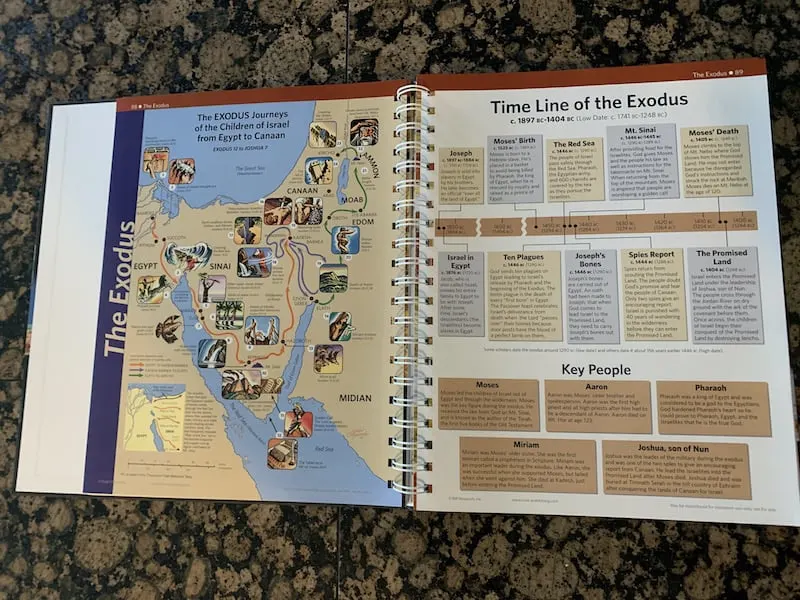
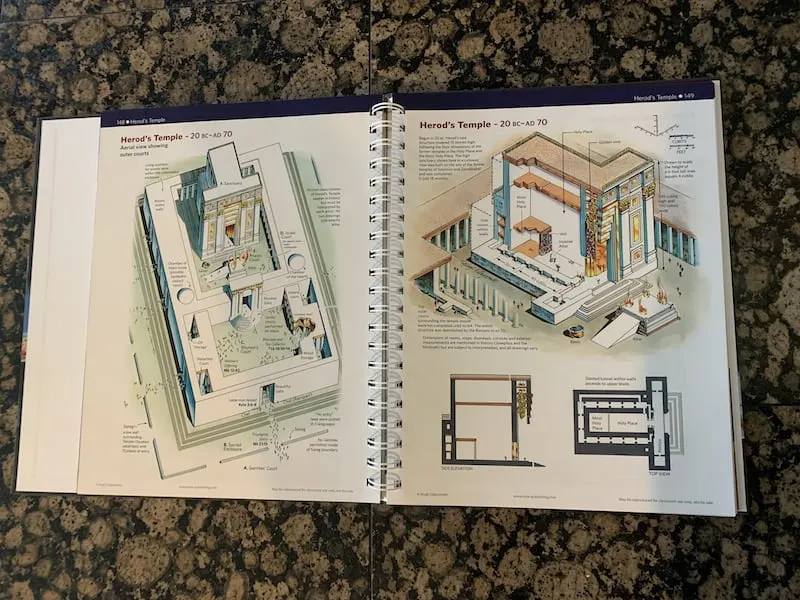
Isn’t that cool? No joke I geek out on this stuff. I love it.
10. Books on the Topic of Studying the Bible
There are many methods to studying God’s Word.
Just to name a few…
- Inductive
- Word studies
- Thematic
- Verse by verse
- Acronyms like SOAP
*For more on this check out my 7 Bible Study Methods.
And you can learn more about these methods and more through books. These books help you expand the way you study and try new things. These are my top 3 favorite books:
11. Old and New Testament Survey (Bible Survey)
Surveys give an overview of all the themes, culture, historical aspects, theological insight, of the scripture and break it down by each book in the Bible. Surveys are usually used in seminary and college courses, but I believe the laymen can really benefit from a good Bible survey.
You can buy them individually by Old or New Testament you can buy a whole Bible Survey. Usually, individual surveys are more robust. You can also purchase survey courses online.
These are surveys I have used:
12. Bible Studies
This last one may seem simple, but they are a good tool to help you study scripture. I remember the Lord led me through a season of learning about idolatry. I went to the Christian book store and picked up a study by Kelly Minter called No Other Gods.
That Bible study rocked me! It’s been at least 8-10 years since I did it and I still reflect back to the study I did within it on Rachel and Leah.
These kinds of Bible studies can be an incredible tool for you to go deeper on a given subject. It’s like having a teacher walk you through a study. It’s also something you can do solo or with others.
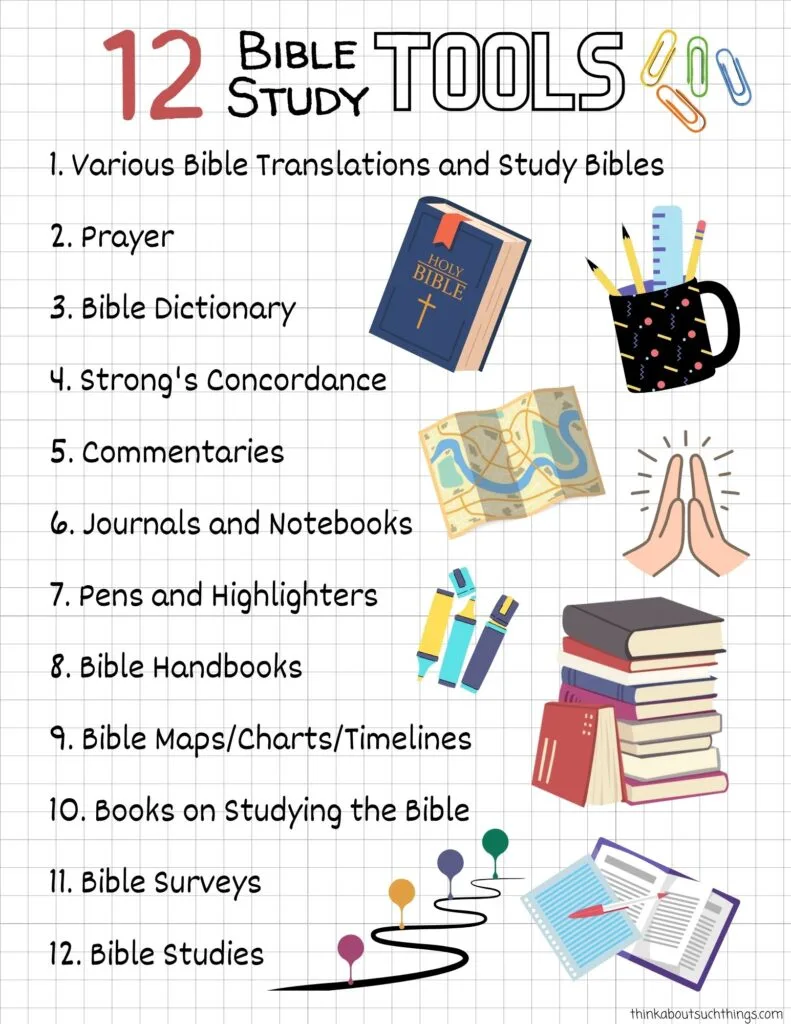
All 12 of these tools for studying the Bible are extremely helpful for you to dig deeper. And the great thing in our modern world is that we can have access to most of these with a few clicks on our computer.
Now, out of these 12 tools is there one that really stuck out to you? Or is there a tool that I missed? Drop me a comment below and share it with me and others. Let’s help each other grow in God’s Word.

Melissa is a passionate minister, speaker and an ongoing learner of the Bible. She has been involved in church and vocational ministry for over 18 years. And is the founder of Think About Such Things. She has the heart to equip the saints by helping them get into the Word of God and fall more in love with Jesus. She also enjoys family, cooking, and reading.
She has spoken in churches in California, Oregon, Texas, and Mexico and has been featured in Guidepost Magazine and All Recipes Magazine. Read More…














